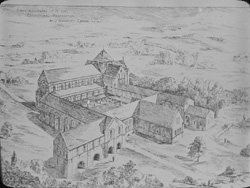 |
 |
 |
 |
 |
 |
 |
|
Rise and Fall I: Kirkstall from the late twelfth century to the mid-thirteenth century (1/7)
Alexander (1147-82) achieved what was required of a founding abbot and established a solid framework for the development of monastic life upon which his successors could expand. He secured papal protection of the abbey and royal confirmation of their lands and possessions. The period until c. 1210 was one of general growth and during this time the community received about 138 grants; 128 of these were gifts of land, others included cash payments,(9) buildings, rights of way, and even a grant of twenty cart-loads of hay.(10) After 1210, benefactions to Kirkstall, as indeed to other Cistercian abbeys, waned. This process of expansion and consolidation was not always easy and Alexander’s immediate successors, Ralph and Lambert, faced particular problems over the abbey’s lands. When Ralph Haget (1182-c. 1190), a former monk of Fountains, became abbot Kirkstall was not a wealthy house, but at least it had no debts. Ralph, however, soon had to deal with external quarrels, loss of herds, the failure of produce, and the loss of the abbey’s grange at Micklethwaite, which was Kirkstall’s greatest source of support.This had a devastating impact, causing the community to disband for a short period and seek refuge at neighbouring Cistercian houses.
In an attempt to recover their lands at Micklethwaite, Ralph presented the king with precious gifts which included a golden chalice and a manuscript of the Gospel, to win his favour. His efforts were, alas, in vain and Ralph was reproached by some members of the community for sacrificing the abbey’s treasures. Kirkstall did not actually recover their lands at Micklethwaite until Helias’ abbacy, during the reign of King John (1199-1216). Ralph’s successor, Lambert (c. 1190-3), ‘a man of supreme innocence and singleness of mind,’(11) was embroiled in a tussle over the abbey’s grange of Cliviger, but was otherwise credited by the chronicler of the house with establishing peace and sufficiency. |
